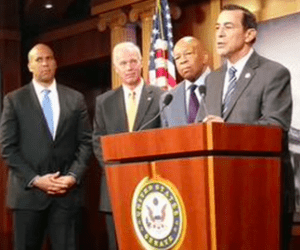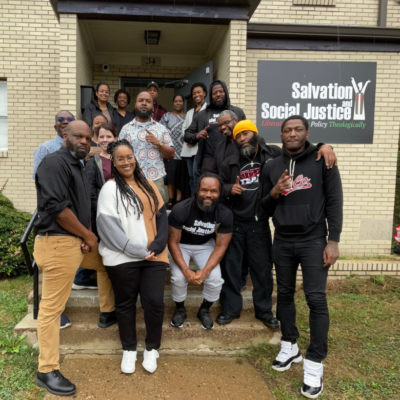Individuals with Criminal Records Could Receive ‘Fair Chance’ at Employment with New Legislation
By the CSG Justice Center Staff
Rep. Darrell Issa (R-CA) introduces the Fair Chance Act, along with, from left to right, Sens. Cory Booker (D-NJ) and Ron Johnson (R-WI), and Rep. Elijah Cummings (D-MD).
A group of bipartisan lawmakers introduced on Thursday, Sept. 10, legislation that would allow people who were formerly involved with the criminal justice system to apply for federal jobs without disclosing previous criminal history until the final stages of hiring.
Presented by U.S. Sens.…
By the CSG Justice Center Staff

Rep. Darrell Issa (R-CA) introduces the Fair Chance Act, along with, from left to right, Sens. Cory Booker (D-NJ) and Ron Johnson (R-WI), and Rep. Elijah Cummings (D-MD).
A group of bipartisan lawmakers introduced on Thursday, Sept. 10, legislation that would allow people who were formerly involved with the criminal justice system to apply for federal jobs without disclosing previous criminal history until the final stages of hiring.
Presented by U.S. Sens. Cory Booker (D-NJ) and Ron Johnson (R-WI) and U.S. Reps. Elijah E. Cummings (D-MD) and Darrell Issa (R-CA), the Fair Chance Act would align itself with the “Ban the Box” movement by prohibiting federal contractors and agencies from asking about the criminal history of job applicants until an applicant receives a conditional offer of employment.
In recent years, “Ban the Box” policies have been embraced by more than 100 cities and 18 states, as well as companies such as Walmart, Koch Industries, Target, Home Depot, Starbucks, and Bed, Bath & Beyond. To reduce barriers to employment for people who had previously been involved with the criminal justice system, these employers have eliminated the need for job applicants to check a box on their applications if they have prior felony convictions.
“Empowering people with records to become productive members of society instead of repeat offenders is not only fiscally sound, it’s the morally responsible thing to do,” Sen. Booker said. “There are millions of Americans with records who are quickly passed over by employers without considering their skills or qualifications because of their history. Sadly, this approach only increases the likelihood of recidivism at great cost to taxpayers and communities in New Jersey and across the country. The Fair Chance Act seeks to dismantle this unfair barrier in federal hiring to ensure these Americans are given a second chance and a fairer shot at making a better life for themselves.”
While the Fair Chance Act would prohibit all branches of the federal government and all federal contractors from requesting criminal history information from applicants until later in the hiring process, it includes exceptions for positions related to law enforcement and national security duties, and positions requiring access to classified information.
Sens. Booker and Johnson and Reps. Cummings and Issa were joined in their support of the Fair Chance Act by U.S. Sens. Tammy Baldwin (D-WI), Sherrod Brown (D-OH), and Joni Ernst (R-IA), as well as U.S. Reps. Sheila Jackson Lee (D-TX), Earl Blumenauer (D-OR), Bonnie Watson Coleman (D-NJ), Cedric Richmond (D-LA), John Conyers (D-MI), and Bobby Scott (D-VA).
“One of the most difficult parts of coming into the criminal justice system is the journey coming out of it,” Rep. Jackson Lee said. “For an individual who has paid their debt, the process of reentering society is paved with tremendous and often insurmountable obstacles … In a nation where one third of our adult population has a criminal record, we must acknowledge and confront the damaging and crippling effects of mass incarceration. This legislation will not prevent the inquiry all together—employers can ask later in the hiring process—but it will allow candidates to get a foot in the door.”
The Fair Chance Act reflects the momentum in Washington, DC, behind efforts to support the successful reentry of formerly incarcerated individuals. U.S. Sens. Rob Portman (R-OH) and Patrick Leahy (D-VT) and U.S. Reps. Jim Sensenbrenner (R-WI) and Danny Davis (D-IL) recently introduced the Second Chance Reauthorization Act of 2015, which would continue targeted funding through 2020 for state and local reentry programs that are proven to reduce recidivism, lead to better outcomes for people released from prison, and save prison costs. The reauthorization also makes improvements to the Second Chance Act, originally enacted in 2009, including consolidating existing reentry programs to operate more efficiently and providing separate planning and implementation grants to ensure that projects are well-developed at each stage and are informed by the latest research.
The CSG Justice Center is also promoting the need for fair hiring practices through its Reentry and Employment Project. The project aims to improve outcomes for people formerly involved with the criminal justice system by facilitating conversations about employment between business leaders and government officials across the country. These conversations were inspired by “State Pathways to Prosperity,” an initiative launched by the CSG Justice Center in June 2014 in which 1,650 corrections, reentry, and labor professionals participated in extensive roundtable discussions at the White House about barriers to reentry for individuals with criminal records.
Find other events
You might also be interested in
In response to growing calls for police reform in New Jersey, particularly following the shootings of Najee Seabrooks…
Read More Apply Now: Join a Learning Community for Community and Crisis Response Teams to Improve Responses to Youth
Read More
Apply Now: Join a Learning Community for Community and Crisis Response Teams to Improve Responses to Youth
Read More
 Apply Now: Join a Learning Community Focused on Substance Use and Overdose Community Response Programs
Read More
Apply Now: Join a Learning Community Focused on Substance Use and Overdose Community Response Programs
Read More



















